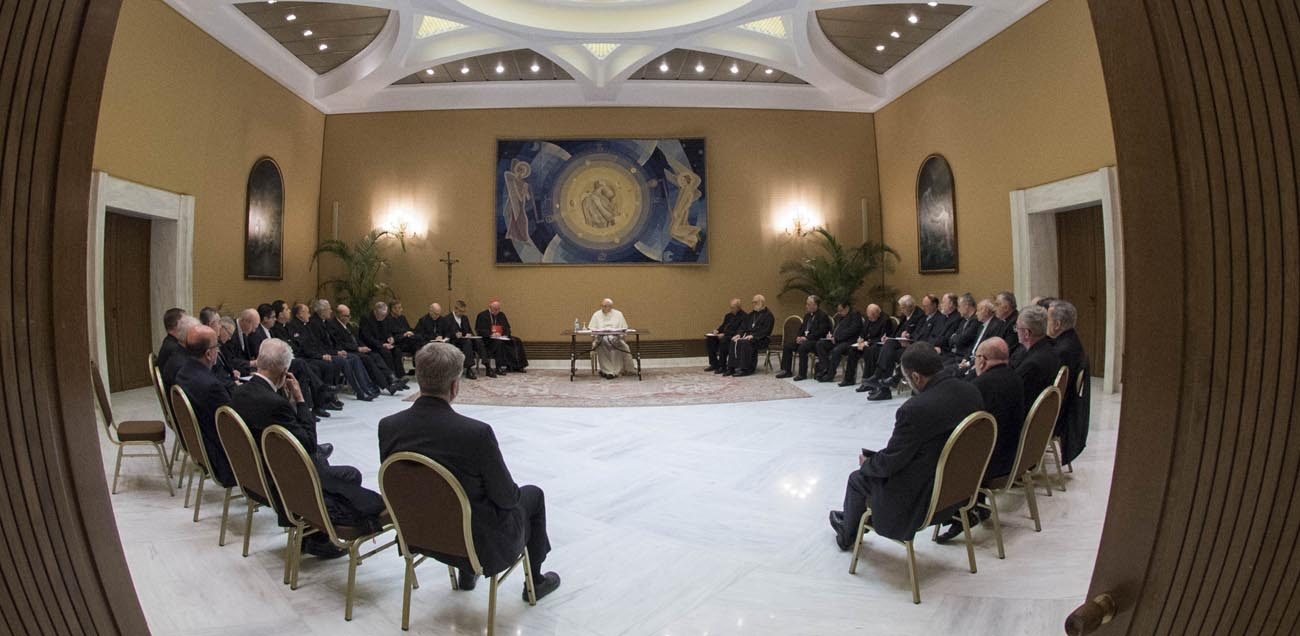VATICAN CITY (CNS) — While Pope Francis was continuing his efforts to heal a church wounded by the scourge of sexual abuse, bishops in Chile face an uphill battle back at home to regain the trust they have lost.
The pope was scheduled to have private meetings June 1-3 at the Vatican with five priests who are survivors of sexual abuse and with two priests and two lay people who have been helping the survivors.
The day before those meetings began, the bishops of Chile released a letter from Pope Francis to the entire church in the country, saying “never again” to a culture that not only allowed sexual abuses to occur but also “considered a critical and questioning attitude as betrayal.”
[hotblock]
After meeting with Pope Francis in Rome May 15-17, most of the bishops offered their resignations to the pope “to assume responsibility — not without pain — for the serious acts that have occurred.”
As they awaited the pope’s decision, however, several notable figures in the Chilean hierarchy were dealing with new revelations about cases of abuse and negligence in their dioceses.
Bishop Alejandro Goic of Rancagua was forced to suspend 14 of the diocese’s 68 priests May 19 after an investigative report by Chilean news channel Tele 13 alleged there was a sex-abuse ring made up of clergy and known as “La Cofradia” (“The Brotherhood”).
Although presented with evidence of the group’s existence by a local youth minister on several occasions, Bishop Goic failed to act, it was reported.
After Tele 13’s report, he apologized for his failure to act, and he resigned as president of the bishops’ commission for abuse prevention.
He was succeeded by Bishop Juan Ignacio Gonzalez Errazuriz of San Bernardo, another controversial bishop because of his support of Bishop Juan Barros of Osorno.
The pope’s appointment of Bishop Barros as head of the Diocese of Osorno in January 2015 sparked protest because of the bishop’s connection to Father Fernando Karadima, his former mentor.
Father Karadima was sentenced to a life of prayer and penance by the Vatican after he was found guilty of sexually abusing boys.
Several of Father Karadima’s victims alleged that Bishop Barros — then a priest — was present when the abuse occurred.
Despite concerns from survivors and members of the Chilean hierarchy, the pope remained steadfast in his support of Bishop Barros.
However, after facing backlash for his support of the bishop during his visit to Chile in January, the pope sent Archbishop Charles Scicluna of Malta and Father Jordi Bertomeu Farnos, a Vatican official, to Chile to gather testimonies from nearly 64 witnesses.
[tower]
The Vatican announced May 31 that the pope will send Archbishop Scicluna and Father Bertomeu back to Chile to visit Osorno with the goal of “advancing the process of reparation and healing of abuse victims.”
In late May news also broke that Father Oscar Munoz Toledo, former chancellor of the Archdiocese of Santiago, was suspended after he reported himself to church authorities for abuse. The suspension occurred Jan. 2, a little over a week before the pope’s visit to the country.
Juan Carlos Cruz, a survivor of abuse by Father Karadima, expressed shock and outrage at the revelation, given the fact that he had reported the abuse he suffered to the former chancellor.
“The insolence — to put it mildly — is astonishing. (Father Munoz) was the one who took our statements, and nothing happened,” Cruz tweeted May 24.
Several days later, Consuelo Gomez Pinto, a former member of the Congregation of the Sisters of the Good Samaritan, shared her story of physical, emotional and sexual abuse in the convent.
In an interview published May 28 on the Chilean news website Emol, Gomez said she was “no longer afraid” to tell her story of sexual abuse at the hands of her superior in the convent in Spain.
“Everyone knew, and they kept me quiet,” she said. “They made me feel that I was at fault for everything. But now I understand that this is a story that I lived, that it is mine and that I am not the only one.”
Although both the religious order and the Chilean bishops’ conference issued separate apologies, Gomez said she was angered mostly by the inaction of the Vatican nuncio to Chile, Archbishop Ivo Scapolo.
During a meeting with Archbishop Scapolo, she said, “I told him my whole case, that I felt terrible and everything that I went through in Spain.”
“But what angers me now is that the nuncio, knowing all of this, did nothing,” Gomez said.
Appointed nuncio to Chile in 2011, Archbishop Scapolo has faced a wave of criticism from survivors for his alleged inaction regarding cases of sexual abuse.
In an interview with La Tercera, Father Sergio Diaz Cubillos of the Diocese of Tacla said he was given an appointment with Archbishop Scapolo after reporting a fellow priest who abused several children. He traveled to the nunciature in Santiago along with several children who were victims of abuse by the priest.
“We arrived in the rain, cold and he told me that he couldn’t welcome us, that it wasn’t because of me but because of the children who came with me. How can I not be wounded if the pope trusts this nuncio, or fully trusted him?” Father Diaz asked.
The nunciature released a statement May 24 saying that Archbishop Scapolo never “knew of the complaint that (Father Diaz) referred to” and denied he ever scheduled an appointment with the priest.
PREVIOUS: Sports on Sundays OK, except when used to skip Mass, says Vatican
NEXT: Missionary work is about sharing God’s love, not raising money, pope says



Share this story